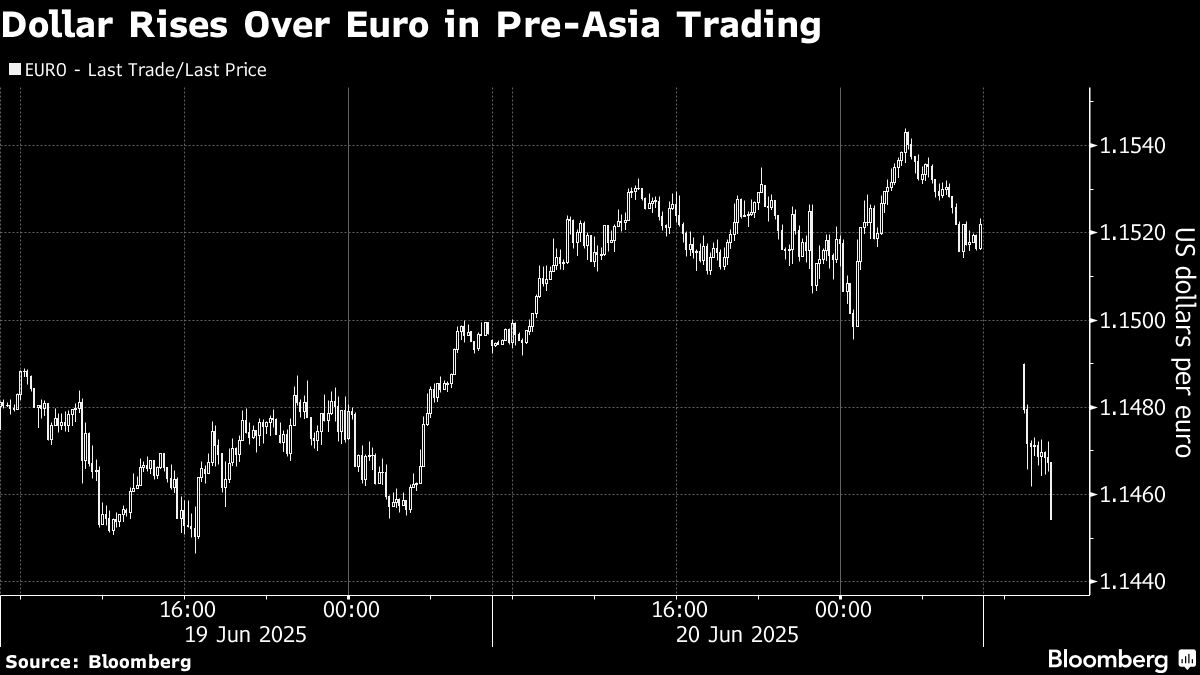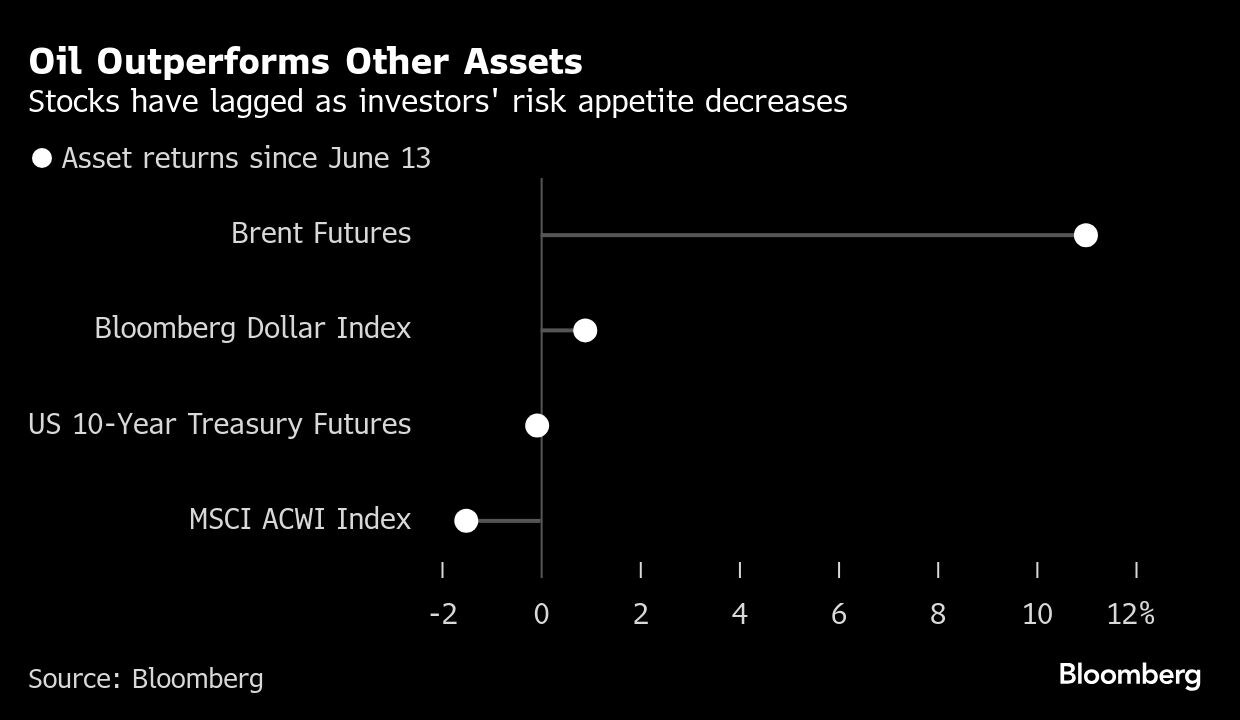
The dollar strengthened in early trading as investors sought to shield against mounting geopolitical risks following the US strikes on Iran.
The US currency saw modest gains against the euro and most major foreign-exchange peers as markets began the week in Asia. Crude oil futures climbed and US equity contracts slipped as the bombing fueled demand for safety and angst about energy supply. Treasuries edged higher.
“We expect some risk off, but not an aggressive one,” said Diego Fernandez, chief investment officer at A&G Banco in Madrid. “The world may be a safer place without the Iranian nuclear threat, but we still need to see the Iranian reaction and how the conflict evolves.”

Market reaction had been generally muted since Israel's initial assault on Iran earlier this month: Even after falling for the past two weeks, the S&P 500 is only about 3% below its all-time high from February. And a Bloomberg gauge of the greenback is up less than 1% since the June 13 attack.
That's mostly because investors have expected the conflict to be localized, with no wider impact on the global economy. But moves stand to get bigger if Iran responds to the latest developments with steps such as blocking the Strait of Hormuz, a key passage for oil and gas shipments, or attacking US forces in the region, market watchers say.
“It all depends on how the conflict develops, and things seem to be changing by the hour,” said Evgenia Molotova, a senior investment manager at Pictet Asset Management. “The only way they take it seriously is if the Strait of Hormuz gets blocked because that will affect oil access.”
Iran has vowed to impose “everlasting consequences” for the bombing and said it reserves all options to defend its sovereignty. Meanwhile, Israel resumed its assaults, targeting military sites in Tehran and western Iran.
“This marks a turning point for markets,” said Charu Chanana, chief investment strategist at Saxo Markets in Singapore. The “question is whether US assets can still command a safe-haven premium.”
Still, downside is likely to be limited because some market participants have been preparing for a worsening conflict. The MSCI All Country World Index has pulled back 1.5% since Israel attacked Iran on June 13. Fund managers have reduced their stock holdings, shares are no longer overbought and hedging demand has increased, meaning a deep selloff is less likely at these levels.

The biggest market reaction since the start of the escalation has been in oil, with Brent futures jumping 11% to $77 a barrel.
Traders are preparing for another surge in crude prices even as it's unclear where the crisis goes from here. That rise is expected to restart on Monday, after the US assault dramatically raised the stakes in a region that accounts for a third of global oil output.
Morgan Stanley's oil analysts said a quick resolution would allow prices to fall back to the $60's per barrel, but continued tension could leave oil in the current range. “Fundamental disruptions to the global supply of oil with a possible hit to shipments through the region would push oil prices a lot higher from here,” they said. Other analysts at the firm flagged that a sustained rise in oil could trigger a short squeeze in the dollar, though underlying fundamentals “still suggest fading this dollar strength.”
Already, the greenback has risen about 0.9% since the conflict started, but it's a relatively small move given the US currency's traditional role as a haven in times of turmoil. The US currency has been battered in recent months by President Donald Trump's trade and fiscal policies.
“The biggest trade around at the moment is short dollar,” said Neil Birrell, chief investment officer at Premier Miton Investors. “No one likes it. But traditionally it's the safe currency people go to, and it might just be that this turns around the fortunes of the dollar.”
What Bloomberg strategists say...
“If the greenback can maintain the gains, breaking the bearish consensus that's been in place since the start of April, it will make other US assets look much more attractive. But if the increase proves to be just a knee-jerk reaction to what is perceived as short-lived US involvement in the Middle-East conflict, the dollar's downward path is likely to resume.”— Sebastian Boyd, Markets Live Blog strategist
The reaction was less straightforward in the $29 trillion market for US Treasuries since the conflict began. Yields initially sank but the moves swiftly reversed over concern about a resurgence in inflation. US Treasuries are, overall, little changed since June 13, with the yield on 10-year notes rising since then by less than two basis points to close Friday at 4.38%.
Following are comments from strategists and analysts on how they expect investors to respond on Monday:
Bob Savage, head of markets strategy and insights at BNY in New York
The US actions over the weekend will be the start of a new course for markets. Some argue that nothing matters, the action defanged nuclear ambitions of Iran, others see this as a start to widening of the conflict. The coming weeks will be pivotal as investors navigate conflicting factors such as inflation, growth, oil prices, trade tariffs and deregulation. The USD's trajectory will be influenced by hedging activities and economic data releases, including durable goods orders and PCE.
Jayati Bharadwaj, a strategist at TD Securities
The dollar is getting a safe haven bid after a while. The source of tension is in the Middle East allowing the dollar to behave like a safe haven again. All eyes are on Iran's response now and if they choose to obstruct the Strait of Hormuz. If they do so, it will support the safe havens and also the oil sensitive currencies.
Emmanuel Cau, head of European equity strategy at Barclays Plc
In the very near term, markets may be worried about Iran retaliation, and whether or not it blocks the Strait of Hormuz... Recent crises in the region have shown that the impact on equities from oil shocks tend to be short lived, and usually end up as medium-term buying opportunities. In fact, if the conflict results in bringing more stability and peace to the Middle East, it could be seen as bullish for risk assets over the medium term.
Anthony Benichou, cross-asset sales at Liquidnet Alpha trading desk
Trump couldn't afford for this to drag on. If oil stays elevated too long, especially heading into the midterms, it's a political headache. High gas prices hit Main Street, fuel inflation, and turn voters against you. So the move had to be fast, surgical, and decisive. Note how impressive the risk premium has stayed contained in oil — short-term vols have spiked, but there's been little spillover elsewhere. If Iran were to shut down (the Strait of Hormuz), they'd be cutting off their own main revenue lifeline — effectively speeding up their own collapse.
Manish Kabra, head of US equity strategy at Societe Generale SA
Equities are likely to only see a shallow drop because central bank policies are much more accommodative than in previous oil shocks. There's also no euphoria in markets in terms of flows. It won't be like we had in 2022 when the S&P 500 and European stocks dropped 20%. Our take is that the Fed may actually ignore any potential oil shocks and that's why I still say there's a good possibility that the S&P 500 will make new highs this year.
Anthi Tsouvali, strategist at UBS Global Wealth Management
We're definitely in a higher-risk environment than we were on Friday. Markets will react, but probably still modestly in equity markets. We're for sure going to see oil going higher. Investors will also have to think about the impact of higher oil on inflation, and if that's the case, Europe is going to be hit harder than the US. Uncertainty has been very high this year and now this is another event that's added to it. So we'll see some volatility but right now, given the information we have, I don't see that it's going to be long lived. So far, we haven't seen bombings of energy facilities and the Strait of Hormuz hasn't closed. Markets will appreciate that. While there's going to be risk-off sentiment for sure, hopefully it's not going to be long lived or too deep.
Charu Chanana, chief investment strategist at Saxo Markets in Singapore
This marks a turning point for markets. While oil and gold are likely to surge on geopolitical risk, the bigger question is whether US assets can still command a safe-haven premium. Rising fiscal risks, institutional strain, and policy unpredictability could accelerate the fading of US exceptionalism. Trump's decision to bypass Congress adds to institutional concerns, likely putting upward pressure on US yields and questioning the credibility premium once attached to US assets. Beyond the immediate market reaction — higher oil, gold, and volatility — investors will be watching for a potential shutdown of the Strait of Hormuz or retaliation against US naval assets. These risks could drive oil sharply higher, add inflation uncertainty, and test the US dollar's safe-haven appeal amid rising concerns over fiscal dominance and institutional erosion.
Gary Dugan, chief executive officer of The Global CIO Office
We expect equities to react in a measured way, be it with some downside risk. Markets are not technically overextended with many trading within 3-5% of their 200-day moving averages. Unless we see a significant spike in oil prices we would expect equity markets to hang in around current levels.
Nirgunan Tiruchelvam, an analyst at Aletheia Capital in Singapore
There are 3 scenarios. A dramatic escalation in Mideast tension: This could see the Strait of Hormuz being blocked and a cycle of revenge. The second is an end to the hostilities in a similar manner that India-Pakistan ended last month. The third is the continuation of the low-intensity bombing by both sides. We expect risk assets to be under pressure under scenarios 1 and 3. Oil and other commodities will also rally under these scenarios.
Jason Schenker, president of Prestige Economics
The level of fear in global financial markets will hinge on the next wave of actions in and the potential duration of this conflict, and it may take days or weeks before the fog of war clears enough for traders to take outlier positions with significant conviction. As for bonds, the impacts of this conflict could be mixed. While the Fed would have less leeway to cut interest rates due to higher crude oil prices, money leaving equity markets may flood into bonds and Treasuries as safe havens, sending bond prices higher and bond yields lower.
Viraj Patel, strategist at Vanda Research
This weekend's US strikes are another reason for hedge funds and CTAs to rush towards the exit on their bearish USD bets. We believe one of the biggest pain trades this summer could be a grind higher in the USD as the reasons for being short USD fall by the wayside. There's a perfect storm brewing for non-US equities — especially crowded cyclical European and Asian markets. Rising geopolitical risks are another headwind for global growth on top of the ongoing slowdown in cross-border trade driven by Trump tariff policies (which certain equity markets seem to be ignoring). We believe Europe and EM could underperform here as recent ‘hot money' inflows unwind as global investors turn more cautious.
Essential Business Intelligence, Continuous LIVE TV, Sharp Market Insights, Practical Personal Finance Advice and Latest Stories — On NDTV Profit.























